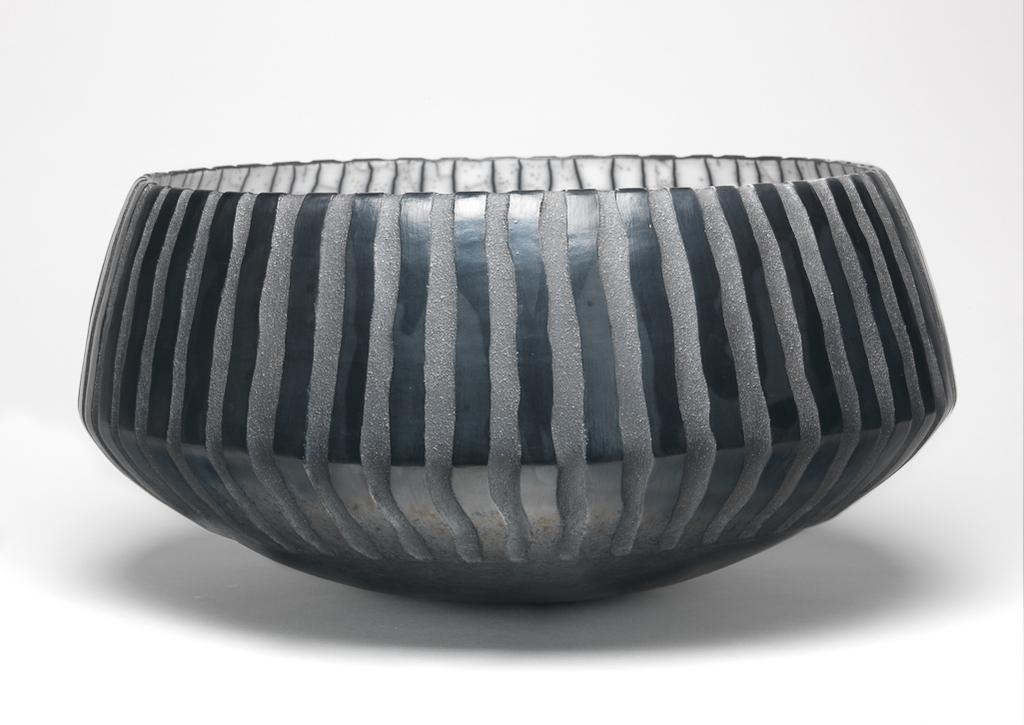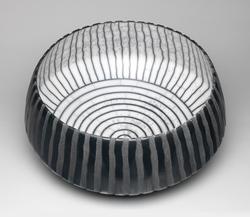Awaiting location update
Titles
Eroded Vessel
Maker(s)
Potter:
Roberts, David (b.1947)
Entities
Categories
Description
Clay vessel, coil formed, treated with resists and slips, eroded and raku fired.
Large round clay vessel with wide neck, the base and lower part of the sides rounded and the upper sides flat and tipped slightly inwards. The exterior decorated with evenly spaced, irregular vertical ribs, alternately deep burnished black and rough, unglazed grey. The interior creamy white, specked with grey smoke and with regularly spaced, irregular thin vertical lines around the sides and regular concentric circles across the curved base, the surface rubbed to a shell-like finish.
Notes
History note: Purchased from the potter by Lynne Geen Drake
Legal notes
Given by Lynne Green Drake, in memory of her husband Jonathan C. Drake (1958-2003)
Measurements and weight
Diameter: 45.5 cm
Height: 21.5 cm
Acquisition and important dates
Method of acquisition: Given
(2016-07-11)
by
Drake, Lynne Green
Dating
21st Century, Early
Elizabeth II
Production date:
circa
AD 2008
Note
David Roberts (b.1947) has an international reputation as a leading practitioner in raku ceramics. He became a full-time potter in 1981, following a decade as an art teacher, and now lives and works at Holmfirth, West Yorkshire. His large vessels are coil built, using a clay mix of ‘T’ material and porcelain. This is one of a series of ‘Eroded Vessels’, with evenly spaced exterior ribs formed by applying strips of latex resist and working between them with water to create the eroded channels. The irregularity of the erosion evokes the edge created by natural phenomena such as a sea tide or river current, while the interior echoes the dynamic of regularly spaced irregular lines on a shell-like finish. Roberts abandoned glazing in the in the early 1990s and creates his surface effects through smoke generated by the raku firing process, aided by slips and resists. He is widely acknowledged as responsible for introducing modern large-scale raku in Europe.
Components of the work
Decoration
composed of
slip
Materials used in production
clay mix
'T' material
clay mix
Porcelain
Techniques used in production
Hand building
: Clay mix comprising ‘T’ material and porcelain, coil formed, treated with slips and resists, eroded with water and raku fired.
Inscription or legends present
- Text: DR
- Location: Underside of base
- Method of creation: Impressed
- Type: Mark
References and bibliographic entries
Identification numbers
Accession number: C.743-2016
Primary reference Number: 209481
Stable URI
Audit data
Created: Thursday 27 October 2016
Updated: Wednesday 15 July 2020
Last processed: Tuesday 13 May 2025
Associated departments & institutions
Owner or interested party:
The Fitzwilliam Museum
Associated department:
Applied Arts





